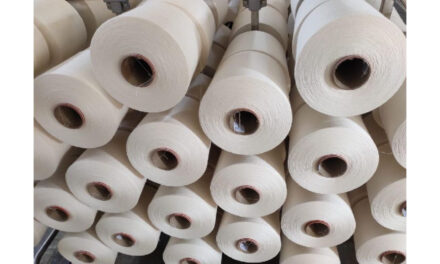 Cotton yarn prices further declined by Rs. 5-8 per kg recently in Mumbai as buyers in the textile value chain were cautious amid speculations of global recession. However, cotton yarn prices remained stable in Tiruppur. Buying of cotton yarn in South India was limited as buyers further tightened their purchases amid uncertainty regarding revival of demand.
Cotton yarn prices further declined by Rs. 5-8 per kg recently in Mumbai as buyers in the textile value chain were cautious amid speculations of global recession. However, cotton yarn prices remained stable in Tiruppur. Buying of cotton yarn in South India was limited as buyers further tightened their purchases amid uncertainty regarding revival of demand.
“Buyers remained absent from the market as they were unsure about demand from the garment industry. Exports were also unviable due to the disparity in prices. Indian yarn cannot be shipped in other countries as domestic cotton is 15 percent costlier,” a trader from Mumbai told.
In Mumbai, 60 count carded cotton yarn of warp and weft varieties were traded at Rs. 1,640-1,680 and Rs. 1,550-1,600 per 5 kg (GST extra) respectively. 60 combed warp was priced at Rs. 360-365 per kg. 80 carded (weft) cotton yarn was sold at Rs. 1,520-1,540 per 4.5 kg. 44/46 count carded cotton yarn (warp) was priced at Rs. 305-310 per kg. 40/41 count carded cotton yarn (warp) was sold at Rs. 282-288 per kg and 40/41 count combed yarn (warp) was priced at Rs. 300-305 per kg, according to market report.
Tiruppur market remained steady amid weaker demand. Mills were facing disparity as they were unable to increase yarn prices. The recent fall in yarn prices also widened mills’ losses. Traders said that buyers were not willing to take risks amid speculations of global recession. Today, 30 count combed cotton yarn was traded at Rs. 295-300 per kg (GST extra), 34 count combed at Rs. 310-315 per kg and 40 count combed at Rs. 320-325 per kg in the Tiruppur market. Cotton yarn of 30 count carded was sold at Rs. 268-272 per kg, 34 count carded at Rs. 275-280 per kg and 40 count carded at Rs. 282-285 per kg, as per market report.
In Gujarat, cotton was traded at Rs. 66,500-67,000 per candy of 356 kg. The prices were up by Rs. 500 per candy since last Tuesday. The ginners were not keen for production due to a disparity of Rs. 300 per candy. Spinners bought less cotton as they are not getting enough demand from the weaving industry. According to the traders, there was uncertainty regarding improvement in demand.










